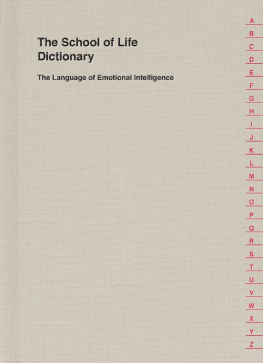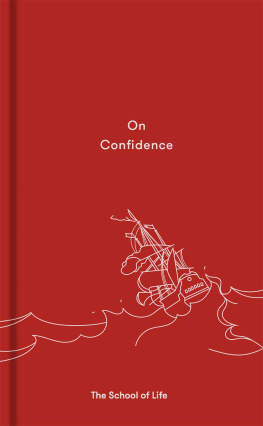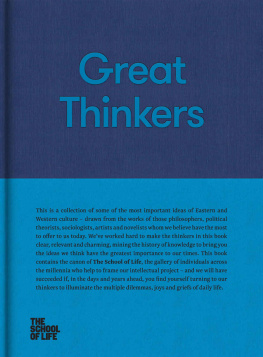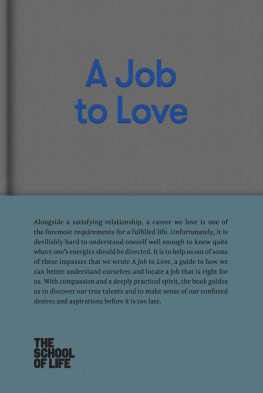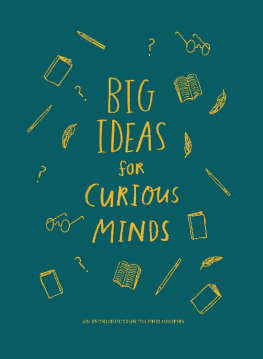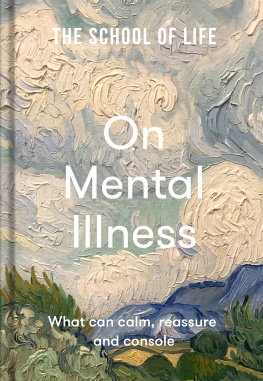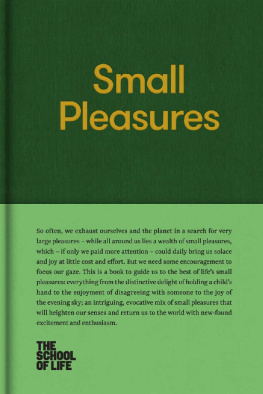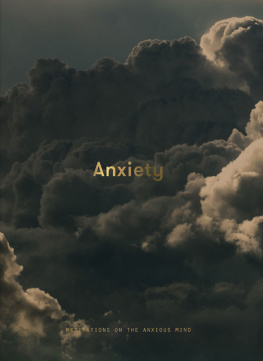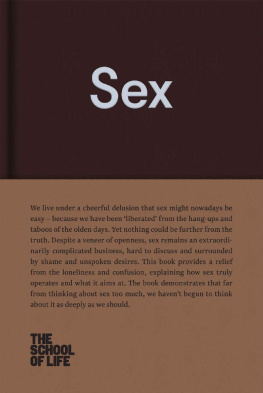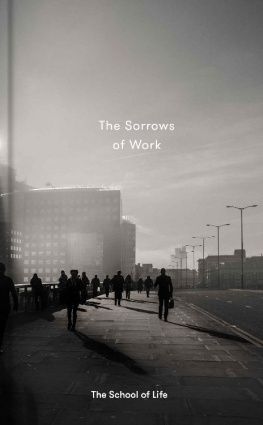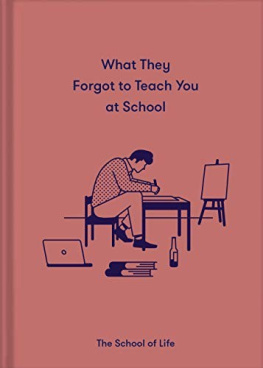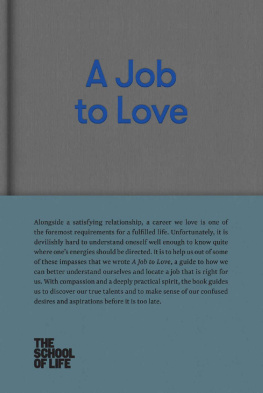The School Of Life - The School of Life Dictionary
Here you can read online The School Of Life - The School of Life Dictionary full text of the book (entire story) in english for free. Download pdf and epub, get meaning, cover and reviews about this ebook. year: 2017, publisher: The School of Life, genre: Home and family. Description of the work, (preface) as well as reviews are available. Best literature library LitArk.com created for fans of good reading and offers a wide selection of genres:
Romance novel
Science fiction
Adventure
Detective
Science
History
Home and family
Prose
Art
Politics
Computer
Non-fiction
Religion
Business
Children
Humor
Choose a favorite category and find really read worthwhile books. Enjoy immersion in the world of imagination, feel the emotions of the characters or learn something new for yourself, make an fascinating discovery.
- Book:The School of Life Dictionary
- Author:
- Publisher:The School of Life
- Genre:
- Year:2017
- Rating:3 / 5
- Favourites:Add to favourites
- Your mark:
- 60
- 1
- 2
- 3
- 4
- 5
The School of Life Dictionary: summary, description and annotation
We offer to read an annotation, description, summary or preface (depends on what the author of the book "The School of Life Dictionary" wrote himself). If you haven't found the necessary information about the book — write in the comments, we will try to find it.
The School of Life Dictionary — read online for free the complete book (whole text) full work
Below is the text of the book, divided by pages. System saving the place of the last page read, allows you to conveniently read the book "The School of Life Dictionary" online for free, without having to search again every time where you left off. Put a bookmark, and you can go to the page where you finished reading at any time.
Font size:
Interval:
Bookmark:

Published in 2017 by The School of Life
70 Marchmont Street, London WC1N 1AB
Copyright The School of Life 2017
Designed and typeset by FLOK, Berlin
Printed in Latvia by Livonia Print
All rights reserved. This book is sold subject to the condition that it shall not be resold, lent, hired out or otherwise circulated without the express prior consent of the publisher.
A proportion of this book has appeared online at thebookoflife.org.
Every effort has been made to contact the copyright holders of the material reproduced in this book. If any have been inadvertently overlooked, the publisher will be pleased to make restitution at the earliest opportunity.
The School of Life offers programmes, publications and services to assist modern individuals in their quest to live more engaged and meaningful lives. Weve also developed a collection of content-rich, design-led retail products to promote useful insights and ideas from culture.
www.theschooloflife.com
ISBN 978-1-9997471-8-3
Excerpt from Little Gidding from Four Quartets, 1942, T.S. Eliot. Copyright 1942 T.S. Eliot; Copyright renewed 1970 by Esme Valerie Eliot. Reprinted by permission of Houghton Mifflin Harcourt Publishing Company and Faber and Faber, Ltd.
All rights reserved.
Dictionary
The Language of Emotional Intelligence

Contents
A dictionary is a guide to language. This is a dictionary for the distinctive language that the School of Life speaks, which is that of emotions. It is a selection of words and phrases that sheds light on our feelings about ourselves, other people and the workings of the modern world.
Too often, were left fighting for a way to explain our emotional intentions; this dictionary is a tool to help us convey our meanings with economy and precision.
The School of Life is an organisation with a simple mission: to increase the amount of Emotional Intelligence in circulation. We seek more emotionally intelligent kinds of relationships, workplaces, economies and culture.
What structures our thinking found in the dictionary entries in the pages ahead are eight central themes, which unfold as follows:
Socrates, the earliest and greatest of philosophers, summed up the purpose of philosophy in one resonant phrase: know yourself. A capacity for self-knowledge is at the heart of our inclinations to forgiveness, kindness, creativity and wise decision-making, especially around love and work. Unfortunately, knowing ourselves is the (always unfinished) task of a lifetime. We are permanently elusive and mysterious to ourselves. We have to catch our real intentions and feelings obliquely, with some of the patience of a lepidopterist.
One of the tasks of culture is to offer us tools to assist us with the task of self-knowledge. We need a vocabulary to name feelings and states of mind; we need encouragement to be alone with ourselves at regular moments; we need friends and professionals who will listen to us with editorial precision and sympathy, and we need works of art that can illuminate elusive aspects of our psyches.
Above all, we need to be modest about our capacity easily to understand who we are and what we want. We should nurture a stance of scepticism towards many of our first impulses and beliefs and submit all our significant plans to extensive rational cross-examination.
Failures of self-knowledge lie behind some of our gravest individual and collective disasters.
Having to live around other people can severely challenge any desire to remain calm, kind and good. The School of Life takes seriously the ambition of being polite and nice, despite the lack of prestige that surrounds these concepts and the constant frictions and misunderstandings that attend communal life.
At The School of Life, we also know that kindness is a skill that has to be learnt and that we must put unexpectedly intense energy into the task of overcoming our first responses to other people, which often veer (quite understandably) towards rage, paranoia and defensiveness.
Two manoeuvres stand out. We must expect less of people not in order to do an injustice to them, but so as to be readier to forgive and accept problems when they arise. And we must learn to see that bad behaviour almost always stems not from evil but from pain and anxiety. We need to direct sympathy and imagination towards a very unfamiliar target: those who frustrate us most.
Relationships are perhaps our single greatest source of both happiness and suffering. Unlike people in previous ages, we dont merely seek a partner we can tolerate; we seek someone we can love, usually over many decades, at an intense pitch of desire, commitment and interest. We dream of someone who will understand us, with whom we can share our longings and our secrets, and with whom we can properly be ourselves.
Then the horror begins. We need to understand why. Some of it is because our childhoods leave us with a legacy of trouble around relating to others. We have difficulties trusting or being close, achieving the right distance or staying resilient. We cannot comfortably express what we feel, and are prone to transfer a lot of emotions from the past on to present-day scenarios where they dont quite belong.
We need to chart our own psyches and offer maps of our madness to partners early on, before we have had the chance to hurt them too much with our behaviour.
Our current relationship difficulties stem in part from a cultural source that we call Romanticism. In the background, we operate with a deeply problematic Romantic picture of what good relationships should be like: we dream of profound intimacy, satisfying sex, an absence of secrets and only a modicum of conflict. This faith in love is touching, but it carries with it a tragic flaw: our expectations turn out to be the enemies of workable mature relationships.
At The School of Life, we are drawn to what we call a Classical approach to love. The Classical view is in certain ways cautious. Classical people pay special attention to what can go wrong around others. Before condemning a relationship, they consider the standard of partners across society and may interpret a current arrangement as bearable, under the circumstances. This view of people is fundamentally, but usefully, dark. Ultimately, everyone is deeply troubled and hard to live with. The only people we can think of as normal are those we dont know very well.
At the School of Life, we are aware of the scale of the hopes and challenges around sex. Although we often believe ourselves to be living in a liberated age, it remains difficult not to feel shame around many of our sexual impulses. It is especially tricky to communicate what we want to those we are drawn to.
The School of Life believes in laying out a sober understanding of what drives desire and in removing some of the shame around fantasies, revealing that many of our more outlandish wishes belong to complex quests for intimacy.
One of the distinctive ideas of modern times is that we dont expect work to be simply a drudgery that we have to undertake to survive. We have high expectations of this huge part of our lives. Ideally, we want work to be meaningful, which involves the belief that we are in some way either reducing the pain or increasing the happiness of other humans.
Next pageFont size:
Interval:
Bookmark:
Similar books «The School of Life Dictionary»
Look at similar books to The School of Life Dictionary. We have selected literature similar in name and meaning in the hope of providing readers with more options to find new, interesting, not yet read works.
Discussion, reviews of the book The School of Life Dictionary and just readers' own opinions. Leave your comments, write what you think about the work, its meaning or the main characters. Specify what exactly you liked and what you didn't like, and why you think so.

